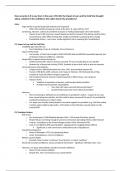Other
How accurate is it to say that, in the years 1941-80, the impact of war and the Cold War brought about a decline in the confidence the nation had in the presidency?
- Institution
- PEARSON (PEARSON)
How accurate is it to say that, in the years 1941-80, the impact of war and the Cold War brought about a decline in the confidence the nation had in the presidency? Unit 1F - In search of the American Dream: the USA, c1917-96? Pearson edexcel history comprehensive essay plan
[Show more]



